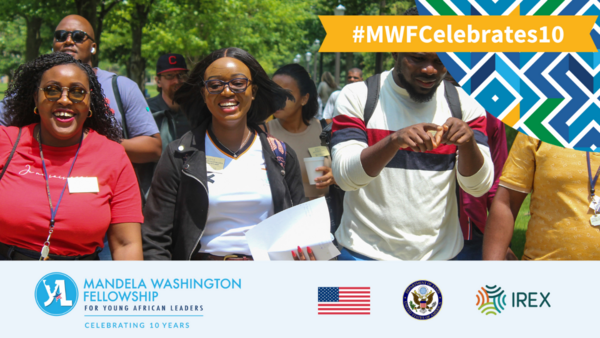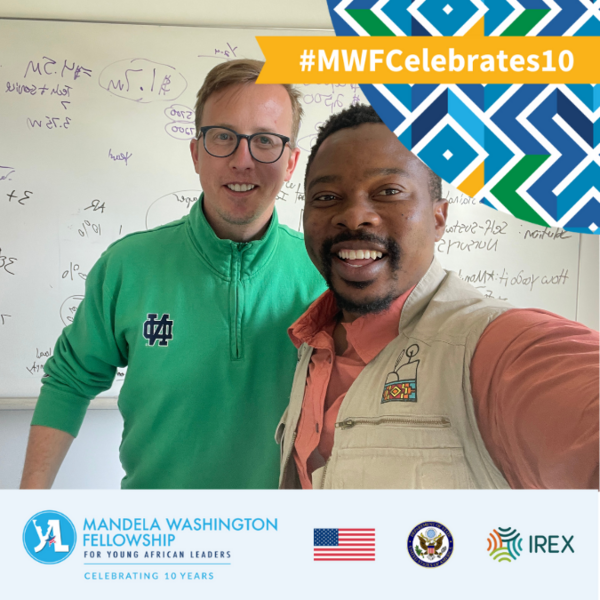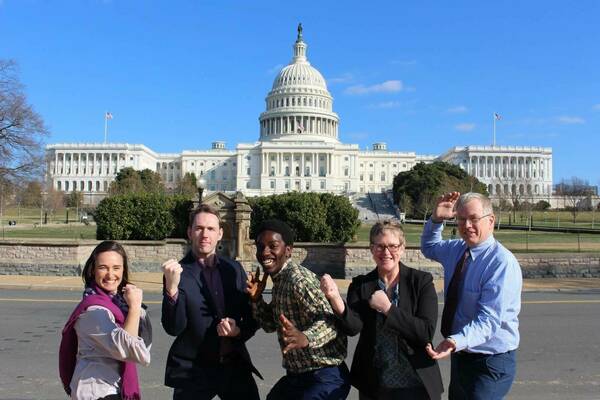

The Mandela Washington Fellowship for Young African Leaders, the flagship program of the Department of State’s Young African Leaders Initiative (YALI). As host Institute for the Fellowship, the Pulte Institute welcomes 25 young African leaders to campus each summer for six weeks of academic coursework, leadership training, and cultural immersion. The Fellowship creates unique opportunities for Fellows and Americans to collaborate as they spur growth and prosperity, strengthen democratic governance, and enhance peace and security in their communities. In celebration of the 10th anniversary of the Mandela Washington Fellowship program at Notre Dame, we had the privilege of speaking with a few of our alums. They shared how the Fellowship at Notre Dame has profoundly impacted their lives, enabling them to use their experiences and knowledge to do extraordinary work in the world.
Siyabulela “Siya” Sokomani

Meet Siyabulela “Siya” Sokomani, a beacon of hope for the environment and an alumnus of the Mandela Washington Fellowship. Siya, founder of Nguni Nursery in Makhanda, South Africa, has been making significant strides in the horticultural industry since 2004. His current focus is on driving restoration efforts for the Savanna Biome, the largest Biome in southern Africa. His restoration work centers around growing high-quality plant and tree saplings and making them accessible and affordable to organizations committed to land restoration, greening projects, and horticultural activities. We had the honor of asking Siya about his experience in the Mandela Washington Fellowship at Notre Dame and how it has influenced his current work:
What was your most memorable experience from the Mandela Washington Fellowship?
Being chosen for the Mandela Washington Fellowship in 2021 was a highlight, although COVID-19 shifted our plans to a virtual format. This change allowed me to focus on launching Nguni Nursery back home while connecting with fellow entrepreneurs online.
The highlight came in 2022 when I visited my host institution in South Bend. I had a long meeting with Matthew Gardner at Notre Dame’s IDEA Center which influenced our business strategy, ensuring the virtual and in-person experiences were invaluable to both my personal growth and our business.
Describe your work to address climate change and promote sustainability strategies.
At Nguni Nursery, we focus on native plant production to combat deforestation and carbon emissions. By growing native trees and plants, we support large-scale reforestation and ecological restoration projects, catering to both local markets and recent exports to the United Arab Emirates.
Our social entrepreneurial efforts have completed greening initiatives in township areas with the internationally renowned One Tree Planted NGO, creating green jobs in the process. In Johannesburg, we’ve empowered pupils in Tembisa by integrating a nursery into their school curriculum, teaching them sustainable practices while beautifying the area.
Our project in Grahamstown aims to plant 300,000 native trees and plants, enhancing biodiversity and offering substantial employment opportunities to the local community. Through our business Nguni Nursery and green initiatives, we strive to improve livelihoods and increase forest cover, demonstrating the powerful synergy between environmental care and community development.
Kaveto Tjatjara

Kaveto Tjatjara is the CEO and founder of Flushh and a 2018 alum of the Mandela Washington Fellowship at Notre Dame. He believes that business can be a force for good in society and puts his beliefs into action through Flushh. The company tackles the sanitation crisis in Namibia by turning human waste into valuable biochar, which can be used as fertilizer.
Working closely with local communities, Flushh is constructing eco-friendly toilets using locally sourced materials. This initiative aims to establish a clean and hygienic environment, thus respecting people's dignity. By adopting this approach, Flushh generates employment opportunities within the communities and enhances public health. Furthermore, the organization forms crucial partnerships to challenge the existing norms. We had the honor of asking Kaveto about his experience in the Mandela Washington Fellowship at Notre Dame and how it has influenced his current work:
What was your most memorable experience from the Mandela Washington Fellowship?
One of my most memorable experiences of the fellowship was sitting in the Mendoza College of Business surrounded by 25 phenomenal young leaders from Africa. One of the best aspects of the Mandela Washington Fellowship is how the local partners and Fellows interact and learn from one another. Realizing that we were all connected in some way and working towards making our communities—and ultimately our world—a better place gave me a strong sense of reassurance. I wish I could experience that magical feeling once again.
Describe your work to address climate change and promote sustainability strategies.
We are seeing the effects of climate change in our everyday lives. In Namibia, which ranks second worst in the world in terms of equality, the droughts have worsened. Over the past 7 years, the country has been experiencing persistent drought conditions. In 2018 and 2019, due to extreme drought events, the Namibian government declared national emergencies, and by the end of 2019, they recorded the worst drought in 90 years. Currently, where there is no water, there is no proper sanitation. Our work at Flushh addresses this problem by building innovative waterless toilets from locally sourced and recycled materials, improving the climate adaptation of underserved communities. We have built a zero waste sanitation system where the toilet waste is collected, and safely transformed into biochar which can be applied by smallholder farmers as a useful by-product. This ultimately allows them to be more resilient to the growing shocks of drought caused by climate change while building a circular economy.
Originally published by at pulte.nd.edu on June 07, 2024.